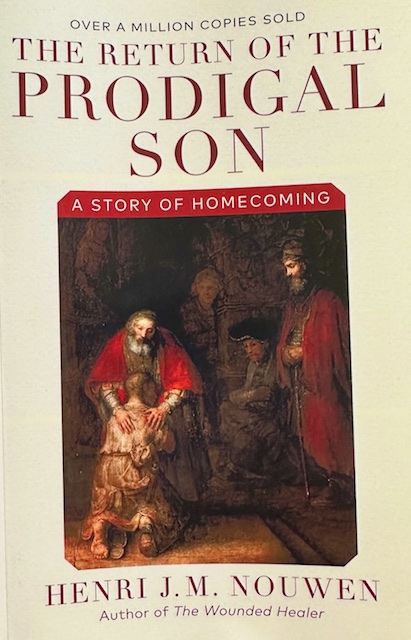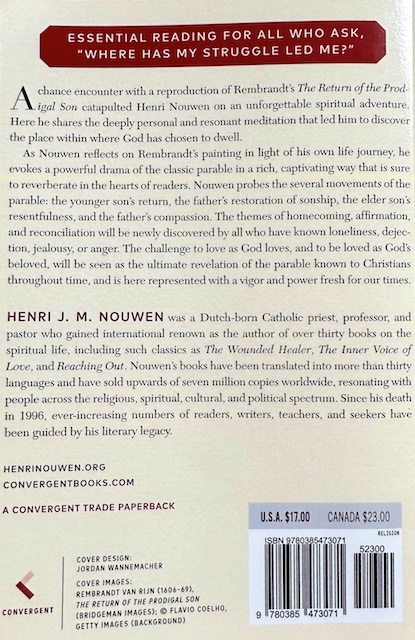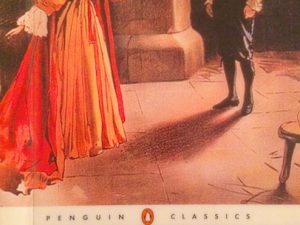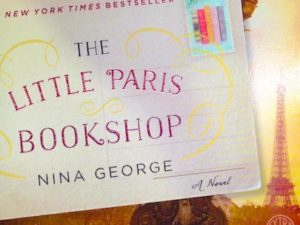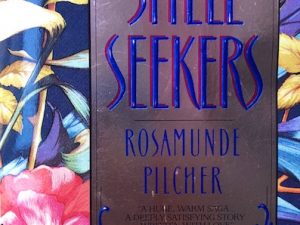In this classic, Henri Nouwen explores the parable of the prodigal son through a close examination of Rembrandt’s painting The Return of the Prodigal Son. He identifies with both the debauchery of the younger son and the sourly priggish but dutiful older son. Eventually, the author realizes that it is the Father figure that is most central to the story, and is a role we need to grow into and emulate more.
He wonders, “which does more damage, lust or resentment?,” and concludes that resentment does, because it churns in a vicious cycle that gets hard to find a way out of, whereas lust eventually bottoms out in unfulfillment, and from there you can pull yourself away.
I feel fortunate never to have felt like the older son in this story– my husband jokes that I’ve never been dutiful enough to– but I’ve been fortunate to be without a tendency to either resentment or comparing myself to others. However, I’ve flagrantly played the part of the profligate younger son, and have since experienced the countless blessings of return and reformation. But this story is not really about any of that, rather how we are infinitely loved and approved of all along, regardless.
Nouwen notes that instead of being called the Return of the Prodigal Son, the story and the painting might be better be called The Welcome of the Compassionate Father. Indeed, we realize the story is more remarkably about the Father, who has endless love and generosity for his offspring. No matter what we’ve done, whether we’ve wasted our substance with “riotous living,” or festered in self-righteous jealousy, our divine parent enfolds us in love and draws us into his celebration of joy.
Can we stop comparing ourselves with what others do or have? Do we have enough self worth to realize that all that God has is ours? Are we accepting all the abundance that is poured forth? Are we growing up and being like that benevolent, forgiving parent-figure ourselves?
“It might sound strange, but God wants to find me as much as, if not more than, I want to find God. Yes, God needs me as much as I need God. God is not the patriarch that stays home, doesn’t move, and expects his children to come to him, apologize for their aberrant behavior, beg for forgiveness, and promise to do better. To the contrary, he leaves the house, ignoring his dignity by running toward them, pays no heed to apologies and promises of change, and brings them to the table richly prepared for them.
I am beginning now to see how radically the character of my spiritual journey will change when I no longer think of God as hiding out and making it as difficult as possible to find him, but, instead, as the one who is looking for me while I am doing the hiding. When I look through God’s eyes at my lost self and discover God’s joy at my coming home, then my life may become less anguished and more trusting.
Can I accept that I am worth looking for? Do I believe that there is a real desire in God to simply be with me?
The parable of the prodigal son is a story that speaks about a love that existed before any rejection was possible and that will still be there after all rejections have taken place. It is the everlasting love of a God who is Father as well as Mother.”
I come away from reading The Return of the Prodigal Son, seeing God as always welcoming us and wanting to celebrate us, and with a desire to express this same unconditional reception and joy toward everyone. This book is also a wonderful example of the meditative possibilities available from dwelling on a work of art and gleaning much meaning and nuance from it.
I give this book 5 stars.
2 Comments
-
There is a fabric wall hanging in our cabin with art depicting this story. It has been there as long as I can remember, my whole life, maybe the entire life of the cabin (that was built in 1923). This fall some guests at the cabin included people without much religious background at all, who brought their Egyptian friend. My sister (a Christian Scientist) was at our house that weekend (which is near the cabin) and gave a very detailed retelling of the story of the Prodigal Son, with commentary, to the guests. They were all very interested and it was cool how universal the message is.
-
I love this book and the wonderful Rembrandt painting associated with it.
We managed to make a trip to St. Petersburg in Russia, a few years ago to see it situated in the Hermitage museum. We were fortunate to get a few precious moments alone with it, despite the museum being crowded. It is truly a wonderful painting of a very uplifting subject. X
